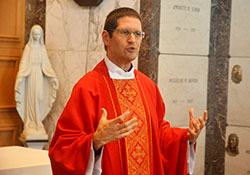‘The integrity of their lives’: Demanding program of human formation shapes future priests amid Church crisis

Father Eric Augenstein, archdiocesan vocations director, gives a homily during an Aug. 9, 2016, Mass at the chapel of Calvary Cemetery in Indianapolis during the annual archdiocesan seminarian convocation. As vocations director, Father Augenstein oversees the thorough evaluation process of potential seminarians for the archdiocese. (File photo by Sean Gallagher)
By Sean Gallagher
Father Benjamin Syberg chuckled when he pictured himself 12 years ago as an enthusiastic but naïve senior at Roncalli High School in Indianapolis applying to become a seminarian for the Archdiocese of Indianapolis.
“I was in over my head,” he said with a laugh.
He went through an application process that included psychological tests, multiple interviews with both clergy and lay Catholics, and a criminal background check. It’s a process the archdiocese began using more than 30 years ago and continues to refine in evaluating potential seminarians.
After being accepted as a seminarian, Father Syberg received eight years of intense priestly formation—four at Bishop Simon Bruté College Seminary in Indianapolis and four at Saint Meinrad Seminary and School of Theology in St. Meinrad, where all of the archdiocese’s seminarians are currently enrolled.
He was ordained a priest in 2014 and now serves as the administrator of St. Lawrence Parish in Lawrenceburg.
“I’m certain that the archdiocese and the psychological team that I worked with must have been very patient to be able to see the potential and all the authentically good things that I was bringing forward,” Father Syberg said in a recent interview with The Criterion. “But they had to see that through a thick layer of an 18-year-old who really didn’t know much about the world or real life.”
A growing level of attention has been given to the way potential seminarians are evaluated and men are formed for the priesthood since the start of the current clergy sexual abuse crisis earlier this year.
Father Eric Augenstein, archdiocesan vocations director, and members of the formation staff at Bishop Bruté and Saint Meinrad recently spoke with The Criterion about these crucial tasks in the life of the Church.
They reflected on the thoroughness needed in evaluating seminarians and in priestly formation, the challenges they face in their work and the blessings that come with it as well.
Before a man can apply to become a seminarian, Father Augenstein will meet with him several times.
If after coming to know him, determining that he might have a priestly vocation and has the basic qualities needed for priestly life and ministry, Father Augenstein will invite him to begin the application process, which he said takes a minimum of three to four months to complete. (Click here for all aspects of the application process)
“It’s a thorough process and a time‑consuming process,” Father Augenstein said. “And it’s designed to be thorough because of the seriousness with which the Church takes the acceptance into formation of seminarians. It’s not something that can be done in a couple of weeks.”
Father Augenstein said the process helps him come to know the applicant more completely.
“You really get to know the heart and soul of a guy, what he brings to formation,” he said.
One aspect of a potential seminarian that is examined in the application process is his self-understanding of his sexuality.
“What we’ve found is that it appears that guys are pretty forthcoming,” Father Augenstein said. “And we ask the psychologists to pay particular attention to all areas of sexuality and sexual maturity. They do a psycho-sexual history. That’s one piece of the larger conversation about how a potential seminarian integrates the various aspects of his humanity in his life.”
Archbishop Charles C. Thompson is also involved in the application process. At the end of the process, a potential seminarian is interviewed by the archbishop. And while Father Augenstein makes a recommendation about the applicant, it is Archbishop Thompson who makes the decision about whether to accept him or not.
“The discernment of vocations is not the responsibility of a single person, such as the vocations director, but includes a vocations team of both clergy and laity,” Archbishop Thompson said. “By the time the candidate meets with me, he has gone through a rather extensive process which is facilitated by Father Eric and his team.”
Not all men who apply to become seminarians are accepted. Father Augenstein said that in his six years as vocations director, there have been several men who have applied but, for various reasons, were not accepted.
Others may begin the process but conclude before completing it that God is not calling them to the priesthood.
“It’s part of the ongoing discernment process, on both the side of the applicant and the side of the Church,” Father Augenstein said.
An integral part of his involvement in this discernment on the part of the Church is prayer.
“As vocations director, as soon as I start conversations with someone who’s approached me about discerning the priesthood, I start praying for them regularly,” Father Augenstein said. “That continues all the way through the process.” †
Related: Demanding program of human formation shapes future priests amid Church crisis
